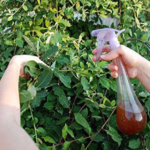Vermi Prom
- greenwhisper_admin
- February 18, 2023
- Blog

“Vermi Prom” is likely a variation of “vermicompost,” which is a type of compost made using worms. Vermicompost is produced by feeding organic waste materials to worms, which then digest and break down the waste, creating a nutrient-rich soil amendment that is high in beneficial microorganisms.

To make vermicompost, you can create a worm bin using a container with holes for ventilation, bedding material such as shredded newspaper or cardboard, and red worms (Eisenia fetida). You can then add food scraps, yard waste, and other organic materials to the bin for the worms to eat. As they consume the waste, they will produce castings, or worm poop, which is the finished vermicompost. This can then be used as a soil amendment in your garden to improve soil health and fertility.
Vermicompost has many benefits for plants, including improved soil structure, increased nutrient availability, and better water retention. It is also a sustainable and eco-friendly way to dispose of organic waste.

benefits
Vermicompost, also known as “worm compost,” is a nutrient-rich soil amendment made by composting organic waste with the help of worms. It has many benefits for gardening, including:
Improving soil health: Vermicompost adds beneficial microorganisms, such as bacteria and fungi, to the soil. These microorganisms help break down organic matter and make nutrients more available to plants, leading to healthier and more productive soil.
Providing plant nutrients: Vermicompost is high in nutrients such as nitrogen, phosphorus, and potassium, which are essential for plant growth. These nutrients are also released slowly over time, providing a steady supply of nutrients to plants.
Increasing soil moisture retention: Vermicompost helps improve soil structure, which can increase the soil’s ability to hold onto water. This can be especially helpful in dry or arid climates, where water is scarce.
Reducing plant diseases: The beneficial microorganisms in vermicompost can help suppress harmful pathogens in the soil, which can reduce the incidence of plant diseases.
Improving plant growth and yield: When added to soil, vermicompost has been shown to improve plant growth and yield, leading to larger and healthier plants.
Reducing environmental impact: Vermicomposting is a sustainable and eco-friendly way to dispose of organic waste, which can reduce the amount of waste going to landfills and reduce greenhouse gas emissions.
Overall, vermicompost can be a valuable tool for gardeners looking to improve soil health, increase plant productivity, and reduce their environmental impact.







